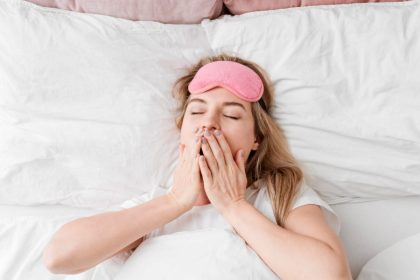Insomnia is a sleep disorder characterized by difficulty falling asleep, staying asleep, or experiencing poor sleep quality. People with insomnia often have trouble falling asleep despite feeling tired, and they may wake up frequently during the night or wake up too early and struggle to fall back asleep.
Insomnia effects on Physical Health
Insomnia can have detrimental effects on physical health. Here are some ways insomnia can impact the body:
- Weakened immune system: Lack of quality sleep can compromise the immune system, making individuals more susceptible to illnesses such as colds, flu, and infections.
- Increased risk of chronic conditions: Chronic insomnia is associated with an increased risk of developing various chronic health conditions, including cardiovascular diseases, diabetes, and obesity.
- Impaired cognitive function: Insufficient sleep affects cognitive function, leading to difficulties with memory, concentration, problem-solving, and decision-making abilities. This can impact daily productivity and overall mental performance.
- Hormonal imbalances: Sleep deprivation can disrupt the balance of hormones in the body. It can lead to increased levels of stress hormones like cortisol, which may contribute to weight gain, insulin resistance, and metabolic imbalances.
- Increased risk of accidents: Fatigue resulting from insomnia can impair motor skills, coordination, and reaction time, increasing the risk of accidents and injuries.
- Negative impact on mood and mental health: Lack of sleep can contribute to irritability, mood swings, heightened anxiety levels, and an increased risk of developing mental health conditions such as depression and anxiety disorders.
- Reduced physical performance: Sleep deprivation can negatively impact physical performance and athletic abilities. It can lead to decreased endurance, reduced strength, slowed reaction time, and impaired coordination.
Insomnia effects on Mental Health
Here are some ways insomnia can impact mental health:
- Increased risk of developing mental health disorders: Insomnia is closely associated with an increased risk of developing various mental health conditions such as anxiety disorders, depression, and bipolar disorder.
- Worsening of existing mental health conditions: Insomnia can exacerbate symptoms of mental health disorders. Lack of quality sleep can make it difficult to cope with emotions, increase irritability, and contribute to a decline in overall mental well-being.
- Impaired cognitive functioning: Sleep is crucial for cognitive functioning, including memory, concentration, and decision-making. Chronic insomnia can lead to difficulties with attention, memory recall, problem-solving, and overall cognitive performance.
- Emotional instability: Lack of sleep can significantly impact emotional regulation. Insomnia may lead to increased irritability, mood swings, heightened emotional reactivity, and reduced ability to manage stress effectively.
- Reduced quality of life: Insomnia can negatively affect various aspects of life, including work performance, relationships, and overall quality of life. The constant fatigue and sleep deprivation associated with insomnia can make it challenging to enjoy daily activities and maintain a positive outlook.
- Increased risk of suicidal ideation: Insomnia has been linked to an increased risk of suicidal thoughts and behaviors. The relationship between insomnia and suicide is complex, but chronic insomnia can contribute to feelings of hopelessness and despair.
Effective Strategies for Managing Insomnia
Managing insomnia can be challenging, but there are several effective strategies you can try. It’s important to note that what works for one person may not work for another, so it may take some trial and error to find the strategies that work best for you. Here are some detailed strategies for managing insomnia:
Establish a Consistent Sleep Schedule
- Go to bed and wake up at the same time every day, even on weekends.
- This helps regulate your body’s internal clock, making it easier to fall asleep and wake up.
Create a Comfortable Sleep Environment
- Make sure your bedroom is conducive to sleep. It should be dark, quiet, and cool.
- Invest in a comfortable mattress and pillows.
- Consider using blackout curtains or a white noise machine if external factors disrupt your sleep.
Limit Exposure to Screens
- The blue light emitted by phones, tablets, and computers can interfere with your sleep.
- Avoid screens at least an hour before bedtime, or use blue light filters on your devices.
Manage Stress and Anxiety
- Practice relaxation techniques such as deep breathing, progressive muscle relaxation, or meditation.
- Keep a journal to write down your worries before bedtime to clear your mind.
Watch Your Diet
- Avoid large meals, caffeine, and alcohol close to bedtime.
- Limit fluids in the evening to reduce nighttime awakenings for bathroom trips.
Exercise Regularly
- Engage in regular physical activity, but avoid strenuous exercise close to bedtime.
- Exercise can help reduce stress and improve sleep quality.
Limit Naps
- If you must nap, keep it short (20-30 minutes) and early in the day.
- Long or late-day naps can disrupt your nighttime sleep.
Cognitive Behavioral Therapy for Insomnia (CBT-I)
CBT-I is a highly effective, evidence-based therapy for insomnia. A trained therapist can help you address thought patterns and behaviors that contribute to insomnia.
Progressive Muscle Relaxation (PMR)
PMR is a relaxation technique that involves tensing and then relaxing each muscle group in your body. This can help reduce physical tension and promote sleep.
Limit Clock-Watching
Constantly checking the clock can increase anxiety about not sleeping. Turn your clock away from you or cover it at night.
Use Sleep Aids Sparingly
Over-the-counter or prescription sleep medications should be a last resort and only used under the guidance of a healthcare professional. They can be habit-forming and may not address the root causes of insomnia.
Seek Professional Help
If your insomnia persists despite trying these strategies, consult a healthcare provider or sleep specialist.
They can help identify any underlying medical conditions or medication side effects that may be contributing to your sleep problems.
Mindfulness and Meditation
Mindfulness techniques can help calm your mind and reduce racing thoughts that may keep you awake.
Guided meditation apps and practices can be helpful for improving sleep.
Light Exposure
Exposure to natural light during the day can help regulate your circadian rhythm.
Spend time outdoors, especially in the morning, to reinforce your body’s sleep-wake cycle.
Relaxing Bedtime Routine
Engage in calming activities before bedtime, such as reading a book, taking a warm bath, or listening to soothing music.
Remember that consistency and patience are key when implementing these strategies. It may take time to see improvements in your sleep patterns, so don’t get discouraged if you don’t see immediate results. If your insomnia persists or worsens, it’s important to consult with a healthcare professional for a thorough evaluation and personalized guidance.
You can find other tips to sleep better here.
Conclusion
Insomnia, a sleep disorder characterized by difficulty falling asleep, staying asleep, or experiencing poor sleep quality, can have significant effects on both physical and mental health. The impact of insomnia on physical health includes a weakened immune system, increased risk of chronic conditions, impaired cognitive function, hormonal imbalances, increased risk of accidents, negative effects on mood and mental health, and reduced physical performance.
Mental health is also affected by insomnia, with an increased risk of developing mental health disorders, worsening of existing conditions, impaired cognitive functioning, emotional instability, reduced quality of life, and an increased risk of suicidal thoughts.
To manage insomnia effectively, there are strategies that can be employed. Establishing a consistent sleep schedule, creating a comfortable sleep environment, limiting exposure to screens, managing stress and anxiety, watching your diet, exercising regularly, limiting naps, considering cognitive-behavioral therapy for insomnia (CBT-I), practicing progressive muscle relaxation (PMR), avoiding clock-watching, using sleep aids sparingly, seeking professional help, practicing mindfulness and meditation, exposing oneself to light during the day, and implementing a relaxing bedtime routine are some effective strategies for managing insomnia.
It’s important to remember that what works for one person may not work for another, and finding the right combination of strategies may require trial and error. Moreover, seeking professional help when necessary is crucial and can provide guidance tailored to one’s specific needs. With patience and consistency in implementing these strategies, improvements in sleep patterns and overall well-being can be achieved.
FAQs
What is insomnia?
Insomnia is a sleep disorder characterized by difficulty falling asleep, staying asleep, or experiencing poor sleep quality. People with insomnia often have trouble falling asleep despite feeling tired and may wake up frequently during the night or wake up too early and struggle to fall back asleep.
How does insomnia affect physical health?
Insomnia can have detrimental effects on physical health, including weakening the immune system, increasing the risk of chronic conditions like cardiovascular diseases and diabetes, impairing cognitive function, disrupting hormonal balance, increasing the risk of accidents, negatively impacting mood and mental health, and reducing physical performance.
How does insomnia impact mental health?
Insomnia can significantly affect mental health by increasing the risk of developing mental health disorders such as anxiety, depression, and bipolar disorder. It can also worsen existing mental health conditions, impair cognitive functioning, lead to emotional instability, reduce overall quality of life, and increase the risk of suicidal thoughts.
How long does it take to see improvements in sleep patterns when using these strategies?
The time it takes to see improvements in sleep patterns varies from person to person. Consistency and patience are key when implementing these strategies. It may take some time to find the combination of strategies that work best for you, so don’t get discouraged if you don’t see immediate results.
When should I seek professional help for my insomnia?
If your insomnia persists or worsens despite trying various strategies, it’s important to consult with a healthcare provider or sleep specialist. They can help identify any underlying medical conditions medication side effects that may be contributing to your sleep problems and provide personalized guidance.





